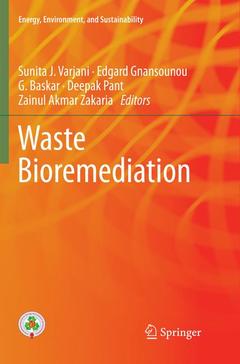Description
Waste Bioremediation, 1st ed. 2018
Energy, Environment, and Sustainability Series
Coordinators: Varjani Sunita J., Gnansounou Edgard, Gurunathan Baskar, Pant Deepak, Zakaria Zainul Akmar
Language: English
Subjects for Waste Bioremediation:
Publication date: 12-2018
Support: Print on demand
Publication date: 12-2017
Support: Print on demand
Description
/li>Contents
/li>Biography
/li>Comment
/li>
This book discusses the bioremediation of both solid and liquid waste, including regional solutions for India as well as globally relevant applications. The topics covered include pollutant reduction through composting, solutions for petroleum refinery waste, use of microorganisms in the bioremediation of industrial waste and toxicity reduction, microbial fuel cells, and microbial depolymerisation. The book also explores the biosorption of metals and the bioremediation of leachates, especially with regard to soil and groundwater remediation. It is a valuable resource for researchers, professionals, and policy makers alike.
Dr. Sunita Varjani is a scientific officer at Gujarat Pollution Control Board, Gandhinagar, India. She holds an M.Sc. degree in Microbiology (2009) and Ph.D. in Biotechnology (2014). Her major areas of research are industrial and environmental microbiology/biotechnology and molecular biology. Dr. Varjani has authored 35 publications and has won several awards and honours, including the Young Scientist Award at the AFRO-ASIAN Congress on Microbes for Human and Environmental Health, New Delhi (2014) and Best Paper Awards for oral presentations at national and international conferences in 2008, 2012 and 2013. She is a member of the editorial board of the Journal of Energy and Environmental Sustainability.
Prof. Edgard Gnansounou graduated with an M.S. in Civil Engineering and Ph.D. in Energy Systems at the EPFL. He is a professor of Modelling and Planning of Energy Systems at the Swiss Federal Institute of Technology Lausanne (EPFL) where he is the director of the Bioenergy and Energy Planning Research Group. He is currently investigating the techno-economic and environmental assessment of bio-refinery schemes based on the conversion of agricultural residues. He is leading research projects in that field in several countries including Brazil, Colombia and South Africa. He has published numerous papers in leading scientific journals. He is a member of the editorial board of Bioresource Technology.
Prof. G. Baskar is currently working as a professor of Biotechnology at St. Joseph’s College of Engineering, Chennai, India. He has published more than 100 papers in national and international journals and five book chapters. His research expertise is in biofuels, therapeutic proteins, microbial enzymes, nanomedicine and nanocatalysis. He received the International Bioprocessing Association’s Young Scientist Award (2015) and the Indian Society for Technical Education (ISTE)-Sayed Sajed Ali National Award (2016).
Dr. Deepak Pant is currently the dea




